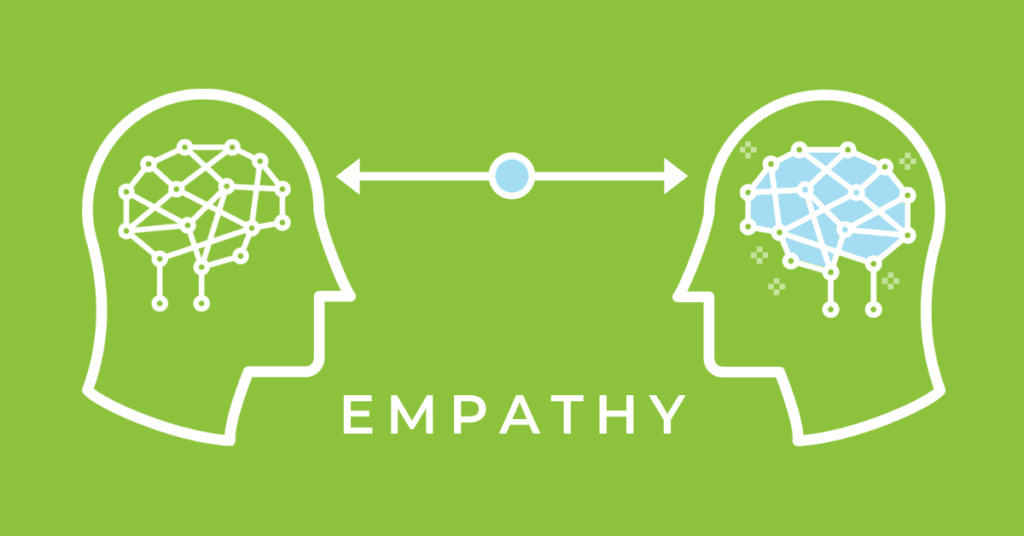The Key to Unlocking Empathy in Sales
Sophia Seltenreich
Every year, sales organizations invest colossal amounts of time and money training their sales teams. From in-depth workshops on cold-calling to rigorous training on campaign orchestration, there are hundreds of sales trainings available to foster and develop sales professionals’ technical skills.
The one thing so many of those trainings fail to cover is the development of people skills or emotional intelligence (EQ). A common thread among industry experts is the necessity of empathy in modern selling, and how it can be leveraged for sales growth.
Here are four essential steps for leveraging empathy in sales.

1. Step Into The Buyer’s Shoes
Empathy fuels connection. Prospects won’t buy from someone who doesn’t truly understand their needs. To really connect, sales professionals need to be able to reach through that phone and deliver empathy, regardless of their own experiences or life situation. Dr. Brené Brown, research professor and author of studies on courage and leadership, explains that “empathy doesn’t require that we have the exact same experiences as the person sharing their story with us…Empathy is connecting with the emotion that someone is experiencing, not the event or circumstance.”
To accomplish this sales technique:
- Imagine a day-in-the-life of your prospect.
- If a prospect is hiring for a role your service could eliminate, reach out to show how you can make their situation easier.
- Identify your prospect’s stressors and fears.
- Suggest ways to solve their problems by researching articles they have shared on LinkedIn.
- If your competitor is having issues, reach out to your prospects to show that you can assuage their situation.
2. Selling is Helping
“Make a recommendation with a win-win attitude,” advises sales author and professor, Neil Kokemuller. A win-win attitude in sales refers to your customer’s “win” – having a solution to their problem – and your “win” of making a sale. Applying empathy in your sales process helps you better understand your customer’s pain points and ensures your recommendation is a helpful solution, rather than means to an end.
In practice: When engaging a prospect, ask questions that exhibit genuine curiosity and authentic empathy. Identify your prospects’ concerns, then go above and beyond to help solve their problems. It’s the best way to earn their respect.
To do so, you’ll have to engage in empathetic listening. Different than active listening, empathetic listening involves putting the sole focus on the other person. Mark Murphy, founder of Leadership IQ, recommends if you want to truly be an empathetic listener, “get rid of any phrases from your lexicon that begin with ‘I’. This includes ‘I find’, ‘I do’, ‘I like to’, and ‘I always’. Each of those phrases takes the focus away from the speaker and puts it onto us.”
Using certain ‘I’ phrases while communicating indicates two things. First, it implies that what the speaker just said didn’t hold your attention so you’re just going to talk about yourself instead. Second, it implies that you’ve already got their problem figured out for them and that they’re less competent for not having figured out the solution themselves.
Sales success comes from putting yourself in your prospect’s shoes, listening with empathy, going the extra mile, and helping them make sense of the information that’s relevant to their success.
3. Growing for Good
We know empathy can help grow sales, so why not grow your sales team with empathetic people? While some characteristics, like competitiveness and assertiveness (not aggression), are alive and well in many sales cultures, more companies are starting to recognize the importance of empathy and act on it by hiring men and women who are innately empathetic.
Saleswomen in particular have been outspoken about how they leverage their innate empathy and careful listening abilities to succeed in sales. However, the capacity for empathy knows no gender. With empathy now scientifically proven to be a sales power tool, it follows that more salespeople, both men and women, should tap into their own empathy source to best support their sales prospects.
4. Empathetic to the End
Remain in your customer’s shoes, even as the finish line approaches. Remember that even when a lead is eager to close a deal, they usually have to get approval on their end. If their boss pushes back, you’ll need to dig deep into your empathy supply to walk with them through the push-back and provide them with the information they need to advocate internally.
The second component of being ‘Empathetic to the End’ is making sure you account for how your deal fits into your customer’s sales cycle vs. your own internal cycle. If you’re truly empathizing with your customer, then you’ll be able to plan according to their schedule instead of making those tempting, nearsighted moves.
Staying empathetic through the end of your deal relieves some pressure from your customer, and reassures them that they’re receiving your full support in the process.
In the end, it all boils down to empathy.
More on empathetic language with words that can help you sell.
Get sales tips and strategies delivered straight to your inbox.
Yesware will help you generate more sales right from your inbox. Try our Outlook add-on or Gmail Chrome extension for free, forever!
Related Articles
Casey O'Connor
Casey O'Connor
Casey O'Connor
Sales, deal management, and communication tips for your inbox

